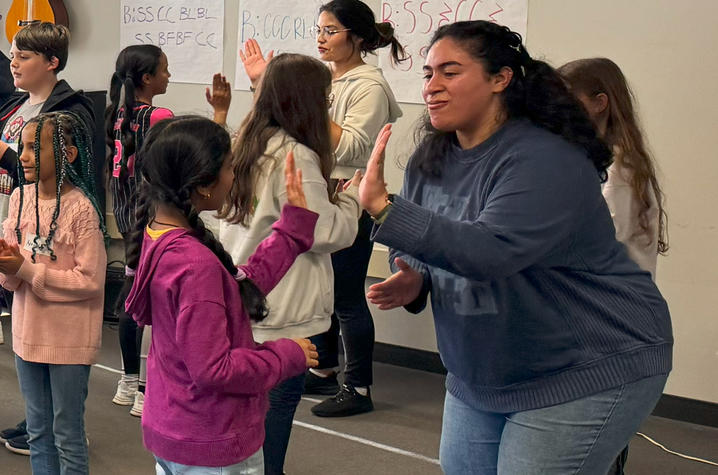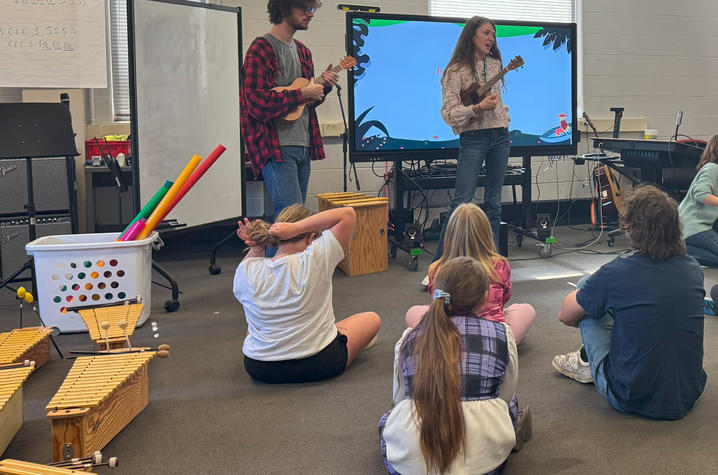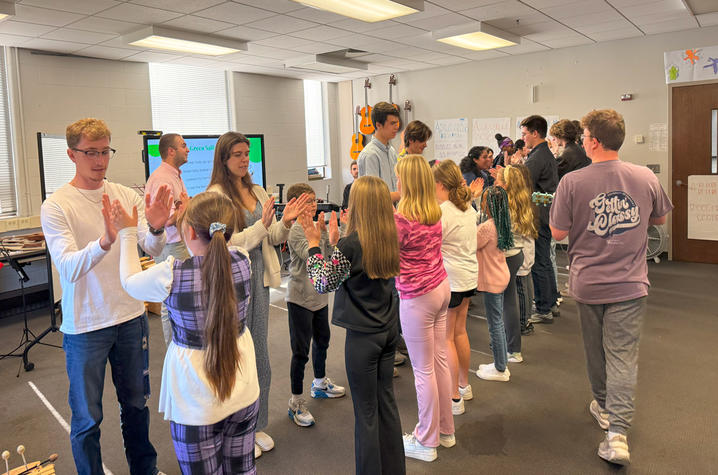Teaching workshop builds confidence in music education
LEXINGTON, Ky. (Jan. 14, 2025) — For University of Kentucky music education students, any opportunity to practice teaching is valuable. When it can be combined with an enriching service project that serves primary and secondary students in the region, that value grows.
On Nov. 8, 2024, the UK School of Music hosted 17 fourth- and fifth-grade students from Franklin County Schools’ gifted and talented program for a day of music making, taught by UK music education students.
This project is an example of service learning, which Martina Vasil, Ph.D., an associate professor of music education in the UK School of Music, says has become a trend among music educators across the country.
“It’s a good idea because you’re connecting to the community you serve and teaching undergrads how to give back to their communities,” she said.
As far back as 2018, UK music education students were traveling around Lexington, playing songs on ukulele for nursing home residents. Vasil said that experience was good for her students, but that she had always wanted to conduct a program on campus for children.
“I wanted our music education majors to experience running a service project for that age group,” Vasil said.
In fall of 2021, Vasil had a a conversation with Franklin County elementary school teacher Rhiannon White, who expressed interest in collaborating with UK for a service learning opportunity in spring of 2022. An annual project was born.
“I got in contact with two teachers from Franklin County and we began organizing a three-hour workshop on campus for students who were gifted and talented in music,” Vasil said.
A unique characteristic of this series of workshops is that it uses modern music — the stuff students are already listening to — as a vehicle to teach concepts like rhythm, melody, harmony and other musical elements.
“In that first workshop no one had ever touched a drum kit or bass guitar, and in three hours the kids workshopped I and presented a final performance — ‘We Don’t Talk About Bruno’ (from the Disney movie ‘Encanto’),” Vasil said. “Then we did it again the following year (in April) with the same modern band focus.”
This year’s workshop was pushed back to fall, and the visiting Franklin County students participated in a day of singing, playing, moving and creating.
Vasil said among the activities that engaged students in musical thinking were handclapping games; chanting; playing a variety of instruments, like ukuleles, barred instruments (pitched percussion instruments like xylophones); guitars; and boomwhackers. Students also listened to music analytically to pick out melodic patterns and motifs, created movements and new melodic patterns to go with the songs and made connections between the music they learned and other nonmusical subjects like geography and history.
Those lessons covered the four National Core Arts Standards: performing, responding, creating and connecting.
In addition to exposing elementary school students to a musical experience they would not otherwise get during their normal school day, the project served as a laboratory for future music teachers. Vasil said the 31 music education students who participated were responsible for preparing presentations, assisting each other with equipment used in the lessons and teaching the visiting elementary school students.
For college students studying to be teachers, these opportunities are simultaneously exciting and frightening, Vasil said.
“The ones who volunteered to teach were a little nervous about the lessons coming up,” she said. “The intended benefit for the music education students was to experience how to organize events for children and to gain more practice teaching them.”
After the event, Vasil said the students observed that it was beneficial to see their own classmates teaching and responding to children and adjusting their instruction in the moment.
“People learn better when they see people like them succeeding,” she said, citing psychologist Albert Bandura’s theory of self-efficacy. She added that her students probably learned more in those three hours of teaching and watching their peers teach than they do in their weekly observations of experienced elementary school music teachers in the field.
One of those students, Lian Rivera, a senior choral music education major from Carolina, Puerto Rico, said that adaptation was important as the lessons proceeded.
“Even though I was prepared, not everything always goes to plan, especially when teaching kids, which can be unpredictable,” Rivera said. “This workshop helped build my confidence in making changes on the spot.”
Junior instrumental music education major Max Gambrell of Louisville helped teach a pirate-themed music lesson. Like Rivera, he learned the importance of remaining flexible and being able to adapt.
“A challenge my group faced is that the kids caught on really quickly to our lesson, and then we weren’t sure in the moment how to stretch the lesson to take more time,” Gambrell said. Our teacher stepped in and she had them create dances that pirates would do and tied it back into the lesson. They really enjoyed that. One kid asked, ‘Do we have to leave?’”
Rivera was pleased with the outcome and how the lessons worked for the students.
“This experience exceeded my expectations,” she said. “(The students) were extremely well behaved and receptive to everything we taught. It was easy to communicate with them, and seeing their progress through the day as the teacher was rewarding.”
As the state’s flagship, land-grant institution, the University of Kentucky exists to advance the Commonwealth. We do that by preparing the next generation of leaders — placing students at the heart of everything we do — and transforming the lives of Kentuckians through education, research and creative work, service and health care. We pride ourselves on being a catalyst for breakthroughs and a force for healing, a place where ingenuity unfolds. It's all made possible by our people — visionaries, disruptors and pioneers — who make up 200 academic programs, a $476.5 million research and development enterprise and a world-class medical center, all on one campus.







